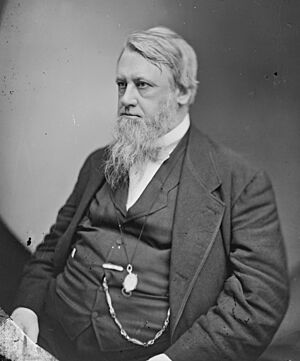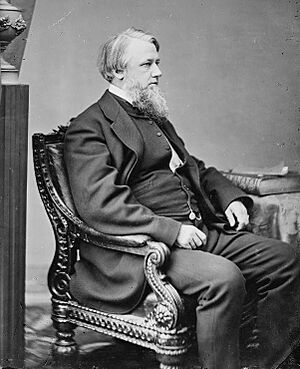Henry B. Anthony facts for kids
Quick facts for kids
Henry Bowen Anthony
|
|
|---|---|
 |
|
| Chairman of the Senate Republican Conference | |
| In office December 1862 – September 2, 1884 |
|
| Preceded by | John P. Hale |
| Succeeded by | John Sherman |
| President pro tempore of the United States Senate | |
| In office January 25, 1875 – February 17, 1875 |
|
| Preceded by | Matthew H. Carpenter |
| Succeeded by | Thomas W. Ferry |
| In office March 23, 1869 – January 24, 1873 |
|
| Preceded by | Benjamin F. Wade |
| Succeeded by | Matthew H. Carpenter |
| United States Senator from Rhode Island |
|
| In office March 4, 1859 – September 2, 1884 |
|
| Preceded by | Philip Allen |
| Succeeded by | William P. Sheffield |
| 21st Governor of Rhode Island | |
| In office May 1, 1849 – May 6, 1851 |
|
| Lieutenant | Thomas Whipple |
| Preceded by | Elisha Harris |
| Succeeded by | Philip Allen |
| Personal details | |
| Born | April 1, 1815 Coventry, Rhode Island, US |
| Died | September 2, 1884 (aged 69) Providence, Rhode Island, US |
| Resting place | Swan Point Cemetery |
| Political party | Whig Know Nothing Republican |
| Spouse |
Sarah Aborn Rhodes
(m. 1837; |
| Alma mater | Brown University |
| Profession | Politician, Editor |
| Signature | |
Henry Bowen Anthony (born April 1, 1815 – died September 2, 1884) was an important American newspaperman and political figure. He was the editor and later an owner of the Providence Journal newspaper. He also served as the 21st Governor of Rhode Island from 1849 to 1851.
Later, he was elected to the Senate and served for many years. He was even chosen twice for a top Senate job called President pro tempore. He stayed in the Senate until he passed away in 1884.
Contents
Early Life and Education
Henry Bowen Anthony was born in Rhode Island. His parents were William Anthony and Mary Kennicut Greene. He went to Brown University and finished his studies in 1833 when he was 18 years old.
After college, he worked as a broker in his brother's business. This company sold cotton products. He sometimes lived in Savannah, Georgia for his work. When his father died in 1845, Henry invested money in the family business. This investment helped him earn a lot of money.
Newspaper Career
In 1838, Henry became the editor of the Providence Journal. An editor decides what goes into a newspaper. By 1840, he became a partner in the newspaper company. He also enjoyed writing poetry.
As editor, Henry believed in strong laws and order. He supported rules that required people to own property to vote. He also wanted to limit the political power of immigrants.
Governor of Rhode Island
Henry was elected as the governor of Rhode Island twice. He won in 1849 and again in 1850. He was a member of the Whig Party at the time. After serving two terms, he decided not to run for a third time. He then went back to focusing on his work at the newspaper.
In 1855, Henry traveled to Europe. He sent letters back to the Journal sharing his thoughts. When he came back, he joined a group called the Know Nothing movement. He used his newspaper to support their ideas. In Rhode Island, this group joined with the Republican Party. Henry was then elected to the United States Senate as an "American-Republican."
United States Senator
Henry Bowen Anthony served as a Republican Senator for Rhode Island. He was a Senator from March 4, 1859, until his death on September 2, 1884. At first, he tried to find common ground with those who wanted to leave the Union. But during the American Civil War, he strongly supported Abraham Lincoln and his efforts to keep the country together.
After the war, he was honored for his support of the Union. He became an honorary member of the District of Columbia Commandery of the Military Order of the Loyal Legion of the United States.
Senate Leadership and Reforms
Senator Anthony was twice the chairman of the committee on printing. Because he knew a lot about printing, he helped make many improvements to government printing. The United States Government Printing Office was created while he was in this role. He was also a member of other important committees.
He voted to remove President Andrew Johnson from office during his impeachment trial. Even while serving in the Senate, he continued to write for the Providence Journal.
He held the important position of President pro tempore of the United States Senate from 1869 to 1873. He held this role again briefly in 1875. He later became the conference chairman in 1875. In this role, he acted much like today's majority leaders. He helped assign senators to committees and decided which bills would be discussed. He often spoke for his party on important issues.
Senator Anthony also created the "Anthony Rule." This was an early attempt to limit how long senators could talk during debates. He was known as the "Father of the Senate" because he served for so long. When he started his fifth term in 1883, his fellow senators showed him special respect. They all stood up as he took his oath. Only one other person before him had been sworn in five times in a row as a Senator.
Death and Legacy
Henry Anthony's funeral was held on September 6, 1884, in Providence. It was the largest funeral ever seen in Rhode Island at that time.
He left a part of his large book collection to Brown University. This collection, called the "Harris Collection of American Poetry," had about 6,000 books. Many of these books were very rare. The collection was started by Albert G. Greene and continued by Caleb Fiske Harris. After Harris died, Senator Anthony finished building the collection.
His name is carved on an old Civil War cannon that belongs to the Squantum Club in East Providence, Rhode Island. This cannon is believed to be the only one from its group that was not captured by the Confederates during the Battle of Bull Run. There is another similar cannon, called the "Bull Run Gun," at the Rhode Island State House that also claims this honor.
Images for kids
 | Jessica Watkins |
 | Robert Henry Lawrence Jr. |
 | Mae Jemison |
 | Sian Proctor |
 | Guion Bluford |


